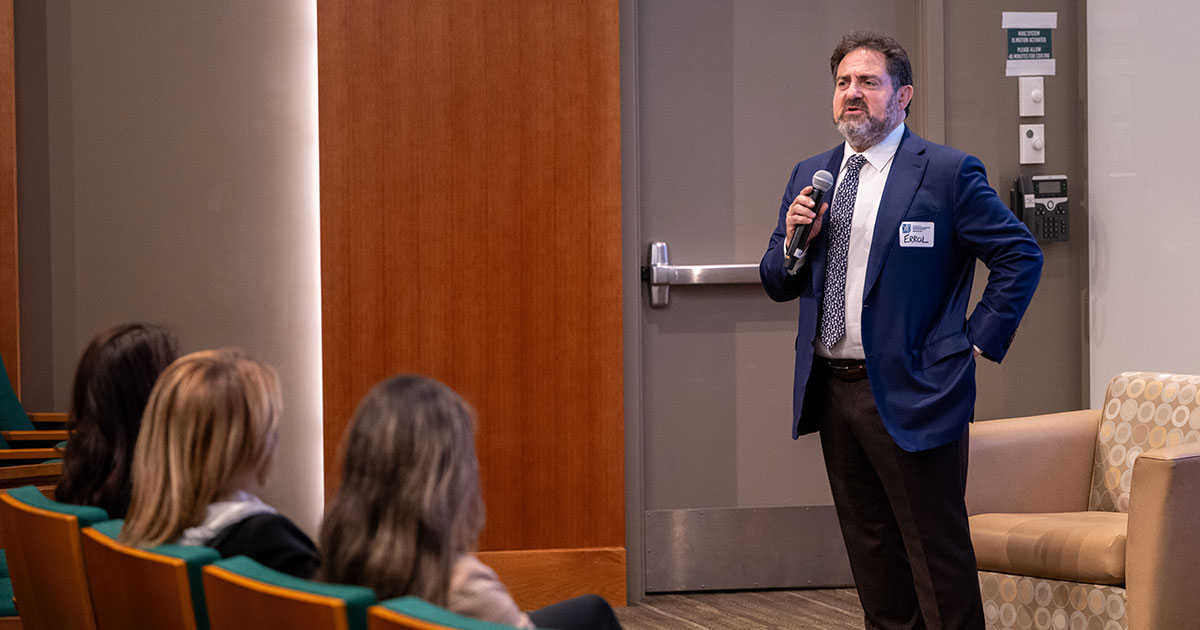More Money Savvy with Babson Financial Literacy Project

Rolando Rojas Bonilla is no stranger to the subject of finance; he just completed the finance track at the nonprofit job training organization Year Up. But personal finance? That’s another story.
The 24-year-old from Cambridge wanted to save and build his credit, but didn’t know the best way to reach those goals. Bonilla found answers in a Babson financial literacy workshop where he learned about loans and credit cards and how to create a savings plan, things he didn’t find out at home or in a classroom.
“My favorite part was about setting financial goals,” he says, adding that in the workshop, objectives were broken down into time periods—how many years it would take to save for a house, for example. “Before this, I had been thinking of personal goals, but didn’t know when I was going to achieve them. Now, I know how much I need to save in five years.”
Helping Young People Thrive
Three years in the making and formally launched last November, the Babson Financial Literacy Project (BFLP) teaches young adults solid financial information in areas such as budgeting, borrowing, credit scores, saving, insurance, investing, and more.
Started by Babson faculty Jennifer Bethel and Kathleen Hevert, and alumnus and entrepreneur-in-residence Stephen Martiros ’83, MBA’85, P’21 ’21, the project was piloted with Babson undergraduates, and has offered workshops to the broader community at Babson Boston and the Boston Public Library.
“If you can change the direction of someone’s life a little bit, they have a tremendous lift,” says Martiros, founder of Financial Building Blocks, an unbiased online educational platform to help people learn basic personal finance. “They go from just bumping along to getting focused on their habits, choices, and goals.”
Part of the program’s uniqueness is found in the delivery method. Instead of dry classroom sessions and PowerPoint presentations, the information is presented in an informal style, and includes short case studies and workshops that are interactive. A goal of BFLP is for meetings to be led by trusted people from within a community or organization, instead of complete strangers.
“Our vision was we wanted to reach out to young adults who didn’t have access to resources to learn about financial literacy,” Bethel says. “A lot of families do not talk about money. Maybe they don’t understand it, and maybe they do—but it’s just not in the conversation.”
Not all high schools and colleges include financial literacy in their curricula, leaving many students stumped about how to open bank accounts, handle credit cards, pay off student loans, and save for retirement.
Financial Literacy: A Global Concern
This is “a global problem,” says Robin Kahn, an executive in residence who is helping build the BFLP. “Almost half the people in this country can’t cover a $400 emergency expenditure without having to borrow money. It’s hard to imagine living your life that way—the amount of stress, and the terrible outcomes that come from that.”
No special financial skills are needed to become a workshop leader, since teaching materials are made available. Hevert says that the project’s train-the-trainer model relies on “bringing respected members of partner organizations into our system, giving them access to all our materials, and teaching them to facilitate case discussions.”
Having complete strangers ask participants to do challenging things like give up immediate gratification (an impulse buy) for delayed gratification (establishing retirement savings) may not go over well. “But, if someone who really knows them and is inspirational and can motivate them to want to give up time to learn this material, that could be a game changer.”
“We feel this is consistent with Babson’s mission to create economic and social value everywhere,” adds Hevert. “What could be better than teaching people outside of Babson how to manage their finances?”
Expanding the Audience
Besides the Boston Public Library, the BFLP has brought workshops to the education support group City Year. The project also has developed a workshop for the local philanthropic group Foundation for MetroWest, and is beginning to work with Wellesley College, families of students in the Boston Public Schools, and an employee resource group at Iron Mountain.
Bethel says this year the BFLP hopes to solidify those relationships and develop more partnerships with social service organizations, colleges, and companies. The plan also includes developing a sustainable financial model via fundraising and partnering with companies that want to support their endeavors.
As much as the team is eager to boost individuals, the positive ripple effects of the BFLP are not lost on them.
“If people are distracted by their finances, then they’re not very productive employees,” Hevert says. “But, also, the more financial stability you can create in individual households, the more they’re able to hire that cleaning person or get their cars repaired. All that spending and the wise decisions people make create a prosperous and stable society.”
Bonilla continues to learn more about personal finances on his own; one resource he’s tapping into is the BFLP’s Knowledge Center, with links to recent related news stories, government and industry reports, and academic research. “My goals have changed a little since the workshop,” he says, “but in financial terms, I feel more educated.”
Posted in Community



